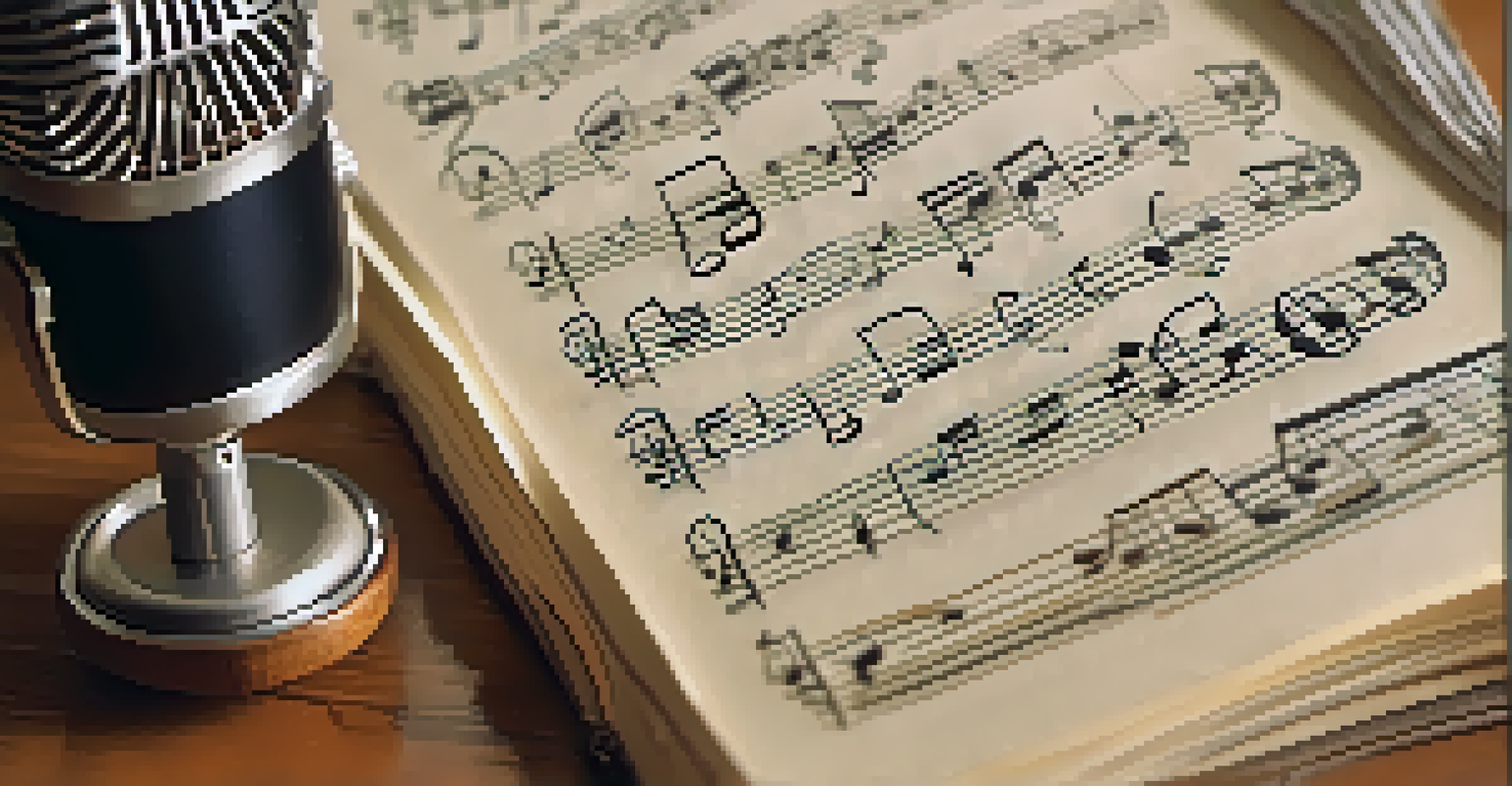Emotional Resonance: The Science of Music and Feelings

Understanding Emotional Resonance in Music
Emotional resonance in music refers to the way melodies evoke feelings within us. This phenomenon happens because music can mirror our emotional states, creating a deep connection between the listener and the sound. For instance, a sad violin piece may bring forth memories of loss, while an upbeat tune can trigger feelings of joy and exhilaration.
Music can change the world because it can change people.
The science behind this emotional response involves our brain's pathways that process sound and emotions simultaneously. When we listen to music, our brain releases neurotransmitters like dopamine, which is associated with pleasure. This biochemical reaction is why a favorite song can lift our spirits or soothe our worries.
Moreover, our personal experiences and cultural backgrounds play a significant role in how we interpret music. What resonates emotionally with one person may not have the same impact on another, showcasing the subjective nature of musical experiences.
The Psychology of Music and Emotions
Psychology researchers have long studied the relationship between music and emotions. They often use methods like surveys and brain imaging to observe how different musical elements, like tempo and harmony, affect our feelings. For example, fast-paced music often evokes excitement, while slower tempos may induce calmness or sadness.

One well-known study found that people could accurately identify the emotional intent of a piece of music more often than not, suggesting that music communicates feelings universally. This ability to discern emotions in music hints at an innate human response, transcending language and cultural barriers.
Music Evokes Deep Emotional Responses
Emotional resonance in music creates a powerful connection, as melodies can mirror our feelings and personal experiences.
This psychological connection also explains why music is a critical component of films and advertisements. A movie's score can heighten tension or evoke nostalgia, guiding the audience's emotional journey and enhancing their overall experience.
The Role of Culture in Musical Emotions
Culture shapes our emotional responses to music, influencing the genres we prefer and how we interpret melodies. For instance, certain musical scales and rhythms are associated with specific emotions in different cultures. In Western music, a minor key often conveys sadness, while in other cultures, the same notes might express joy.
Where words fail, music speaks.
This cultural lens also extends to how we use music in our everyday lives. In some cultures, music is integral to rituals and celebrations, serving as a communal expression of feelings. Think of how weddings often feature joyous music, while funerals may have somber tones, reflecting collective emotions.
Understanding these cultural differences can enhance our appreciation of music from around the world. It also encourages us to explore various genres, broadening our emotional experiences and deepening our connection to music.
Music Therapy: Healing Through Sound
Music therapy is a practical application of our understanding of music's emotional impact. This therapeutic approach uses music to improve mental health, alleviate stress, and even aid in physical rehabilitation. By engaging with music, individuals can express emotions that might be difficult to articulate otherwise.
For example, someone dealing with anxiety might find solace in calming music, helping them to relax and feel grounded. Similarly, those recovering from trauma can use expressive music to process their feelings in a safe and supportive environment.
Cultural Influences Shape Music Perception
Our cultural backgrounds significantly impact how we interpret music, affecting the emotions we associate with different genres.
Studies have shown that music therapy can lead to significant improvements in mood and overall well-being. This underscores the profound effect music can have on our emotional health, illustrating its power as a healing tool.
Neuroscience: How Music Affects Our Brain
Neuroscience has provided fascinating insights into how music affects our brain's structure and function. When we listen to music, multiple areas of the brain become active, including those responsible for emotions, memory, and motor control. This simultaneous activation is why music can evoke vivid memories and strong feelings.
Research has shown that playing an instrument can even alter brain plasticity, enhancing cognitive skills and emotional resilience. For instance, musicians often have stronger connections between brain regions related to emotion and cognition, which might explain their heightened emotional awareness when performing.
These findings highlight not just music's power to move us emotionally but also its capacity to shape our brains in meaningful ways. This connection reinforces the idea that engaging with music can be a vital part of maintaining mental health and cognitive function.
The Power of Lyrics: Words and Emotions
Lyrics add another layer to the emotional resonance of music, transforming melodies into powerful narratives. Words can articulate feelings that resonate deeply with listeners, often mirroring their personal experiences. For example, a song about heartbreak can evoke empathy and understanding, making listeners feel less alone in their struggles.
The interplay between lyrics and music can amplify emotional responses. A poignant lyric set to a moving melody can create a profound experience that lingers long after the song ends. This combination is why many people turn to music during difficult times, seeking comfort in the words and melodies that reflect their emotions.
Music Therapy Aids Mental Health
Engaging with music through therapy can improve mental well-being, helping individuals express emotions and cope with challenges.
Moreover, the storytelling aspect of lyrics allows artists to connect with their audience on a personal level. Many listeners find solace in songs that encapsulate their feelings, reinforcing the idea that music is a universal language of emotion.
Creating Your Own Emotional Connection with Music
Building a personal connection with music can enhance your emotional experiences. This can be as simple as curating playlists that resonate with your feelings or exploring new genres that evoke different emotions. The key is to be intentional about your listening choices and pay attention to how different sounds make you feel.
Consider the moments in your life when music played a significant role. Whether it was a song that marked a special occasion or one that helped you through tough times, these connections shape your emotional landscape. By reflecting on these experiences, you can deepen your appreciation for music's ability to reflect and influence your feelings.

Ultimately, engaging with music mindfully allows you to harness its emotional power. Whether you're looking to uplift your spirits or find comfort in sorrow, music can be a guiding force in navigating your emotional journey.